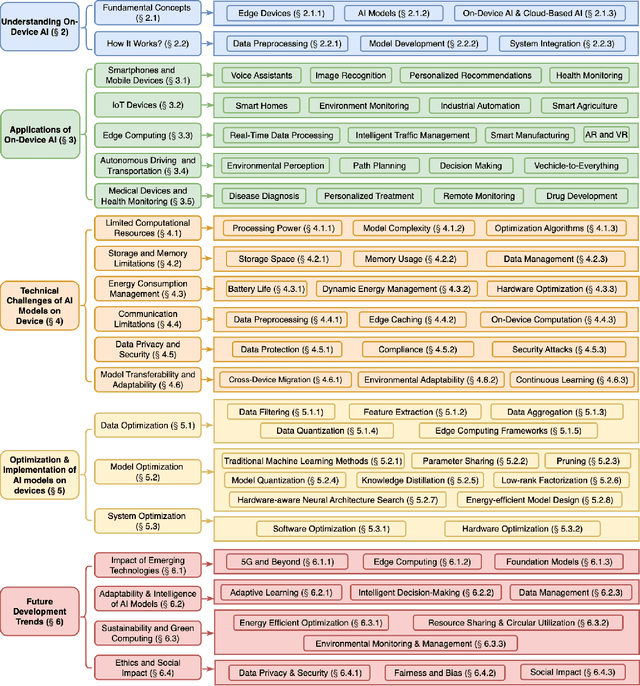Tianhui Meng
Empowering Edge Intelligence: A Comprehensive Survey on On-Device AI Models
Mar 08, 2025



Abstract:The rapid advancement of artificial intelligence (AI) technologies has led to an increasing deployment of AI models on edge and terminal devices, driven by the proliferation of the Internet of Things (IoT) and the need for real-time data processing. This survey comprehensively explores the current state, technical challenges, and future trends of on-device AI models. We define on-device AI models as those designed to perform local data processing and inference, emphasizing their characteristics such as real-time performance, resource constraints, and enhanced data privacy. The survey is structured around key themes, including the fundamental concepts of AI models, application scenarios across various domains, and the technical challenges faced in edge environments. We also discuss optimization and implementation strategies, such as data preprocessing, model compression, and hardware acceleration, which are essential for effective deployment. Furthermore, we examine the impact of emerging technologies, including edge computing and foundation models, on the evolution of on-device AI models. By providing a structured overview of the challenges, solutions, and future directions, this survey aims to facilitate further research and application of on-device AI, ultimately contributing to the advancement of intelligent systems in everyday life.
Joint Optimization of Prompt Security and System Performance in Edge-Cloud LLM Systems
Jan 30, 2025



Abstract:Large language models (LLMs) have significantly facilitated human life, and prompt engineering has improved the efficiency of these models. However, recent years have witnessed a rise in prompt engineering-empowered attacks, leading to issues such as privacy leaks, increased latency, and system resource wastage. Though safety fine-tuning based methods with Reinforcement Learning from Human Feedback (RLHF) are proposed to align the LLMs, existing security mechanisms fail to cope with fickle prompt attacks, highlighting the necessity of performing security detection on prompts. In this paper, we jointly consider prompt security, service latency, and system resource optimization in Edge-Cloud LLM (EC-LLM) systems under various prompt attacks. To enhance prompt security, a vector-database-enabled lightweight attack detector is proposed. We formalize the problem of joint prompt detection, latency, and resource optimization into a multi-stage dynamic Bayesian game model. The equilibrium strategy is determined by predicting the number of malicious tasks and updating beliefs at each stage through Bayesian updates. The proposed scheme is evaluated on a real implemented EC-LLM system, and the results demonstrate that our approach offers enhanced security, reduces the service latency for benign users, and decreases system resource consumption compared to state-of-the-art algorithms.
Fed-Credit: Robust Federated Learning with Credibility Management
May 20, 2024



Abstract:Aiming at privacy preservation, Federated Learning (FL) is an emerging machine learning approach enabling model training on decentralized devices or data sources. The learning mechanism of FL relies on aggregating parameter updates from individual clients. However, this process may pose a potential security risk due to the presence of malicious devices. Existing solutions are either costly due to the use of compute-intensive technology, or restrictive for reasons of strong assumptions such as the prior knowledge of the number of attackers and how they attack. Few methods consider both privacy constraints and uncertain attack scenarios. In this paper, we propose a robust FL approach based on the credibility management scheme, called Fed-Credit. Unlike previous studies, our approach does not require prior knowledge of the nodes and the data distribution. It maintains and employs a credibility set, which weighs the historical clients' contributions based on the similarity between the local models and global model, to adjust the global model update. The subtlety of Fed-Credit is that the time decay and attitudinal value factor are incorporated into the dynamic adjustment of the reputation weights and it boasts a computational complexity of O(n) (n is the number of the clients). We conducted extensive experiments on the MNIST and CIFAR-10 datasets under 5 types of attacks. The results exhibit superior accuracy and resilience against adversarial attacks, all while maintaining comparatively low computational complexity. Among these, on the Non-IID CIFAR-10 dataset, our algorithm exhibited performance enhancements of 19.5% and 14.5%, respectively, in comparison to the state-of-the-art algorithm when dealing with two types of data poisoning attacks.
 Add to Chrome
Add to Chrome Add to Firefox
Add to Firefox Add to Edge
Add to Edge